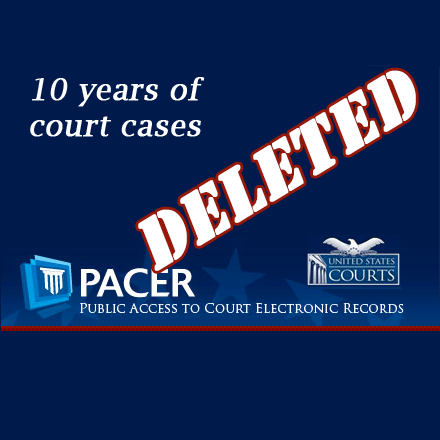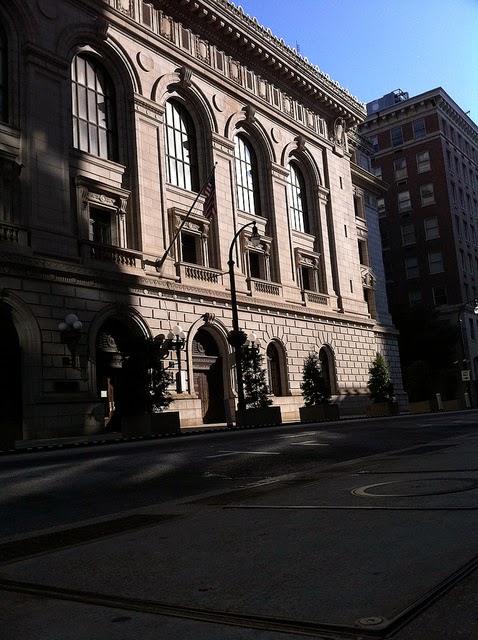| Online: | |
| Visits: | |
| Stories: |

| Story Views | |
| Now: | |
| Last Hour: | |
| Last 24 Hours: | |
| Total: | |
Senator demands US courts recover 10 years of online public records
 Senator demands US courts recover 10 years of online public records
Senator demands US courts recover 10 years of online public records“Restore access,” lawmaker says of docs purged because of computer upgrade issue.
by David Kravets – Sep 13, 2014 6:50 pm UTC
The head of the powerful Senate Judiciary Committee is urging the federal bureaucracy to restore a decade’s worth of electronic court documents that were deleted last month from online viewing because of an upgrade to a computer database known as PACER.
Senate Judiciary Committee Chairman Patrick Leahy (D-Vermont) said the removal of the thousands of cases from online review is essentially erasing history.
“Wholesale removal of thousands of cases from PACER, particularly from four of our federal courts of appeals, will severely limit access to information not only for legal practitioners, but also for legal scholars, historians, journalists, and private litigants for whom PACER has become the go-to source for most court filings,” Leahy wrote Friday to US District Judge John D. Bates, the director of the Administrative Office of the Courts (AO).
The letter, obtained by The Washington Post, blasted the Aug. 10 decision commencing “without any warning to the public, and without prior notification or consultation with Congress.” The letter said that “Given the potential impact of the AO’s recent decision, I urge the AO take immediate steps to restore access to these documents.”
PACER, which charges 10 cents per page, has long been criticized as a deeply dated system that already does too little and charges too much for online access to things like judicial orders and court briefs.
For pre-2010 documents in three appeals courts, you’ll have to go in person.
Affected under the online purge are about a combined decade’s worth of court dockets and all manner of documents at the US Courts of Appeals for the 2nd, 7th, 11th, and Federal Circuits, as well as the Bankruptcy Court for the Central District of California. They were maintained on “locally developed legacy case management systems,” the AO said, and aren’t compatible to be culled into the new PACER system.
The deleted records are available for physical viewing at their respective courthouses in New York City, Chicago, Atlanta, Los Angeles, and Washington, DC.
The most heavily affected court will be the US Court of Appeals for the Federal Circuit, which handles all patent appeals as well as certain other types of cases, like veterans’ claims. The Federal Circuit has lost all cases filed prior to March 1, 2012
For pre-2010 documents in three appeals courts, you’ll have to go in person.
by Joe Mullin – Aug 26, 2014 9:45 pm UTC
US Court of Appeals for the 11th Circuit in Atlanta.
The Administrative Office of the US Courts (AO) has removed access to nearly a decade’s worth of electronic documents from four US appeals courts and one bankruptcy court.
The removal is part of an upgrade to a new computer system for the database known as Public Access to Court Electronic Records, or PACER.
Court dockets and documents at the US Courts of Appeals for the 2nd, 7th, 11th, and Federal Circuits, as well as the Bankruptcy Court for the Central District of California, were maintained with “locally developed legacy case management systems,” said AO spokesperson Karen Redmond in an e-mailed statement. Those five courts aren’t compatible with the new PACER system.
“The dockets and documents in these cases can be obtained directly from the relevant court,” said Redmond. “All open cases, as well as any new filings, will continue to be available on PACER.”
If you’re wondering if “obtained directly” means “obtained in person,” the answer is yes. The AO thinks public access has been maintained because an interested party can physically go to the relevant federal courthouses in New York City, Chicago, Atlanta, Los Angeles, or Washington, DC and request the historical documents. The 2nd Circuit is apparently amenable to e-mail requests as well.
There won’t be any other courts affected, said Redmond, since only five courts were using the locally developed systems that caused problems.
The most heavily affected court will be the US Court of Appeals for the Federal Circuit, which handles all patent appeals as well as certain other types of cases, like veterans’ claims. The Federal Circuit has lost all cases filed prior to March 1, 2012. The 2nd Circuit and 11th Circuit will stop providing access to cases filed before 2010.
It’s hardly ancient history. That means the docket in a case as relevant as the 2008 Cablevision lawsuit—which legalized remote DVRs and was the basis of Aereo’s ill-fated copyright battle with the networks—has been deleted.
PACER has long been criticized as a deeply dated system that already does too little and charges too much for access to things like judicial orders that are important public documents. Its inefficiency spawned a project called RECAP, which worked with the Internet Archive to make PACER documents available for free, instead of the 10 cents per page PACER charges.
Source: http://americankabuki.blogspot.com/2014/09/senator-demands-us-courts-recover-10.html





